A Visit to Yandi Mausoleum: Unraveling the Stories of Yandi and His Legacy
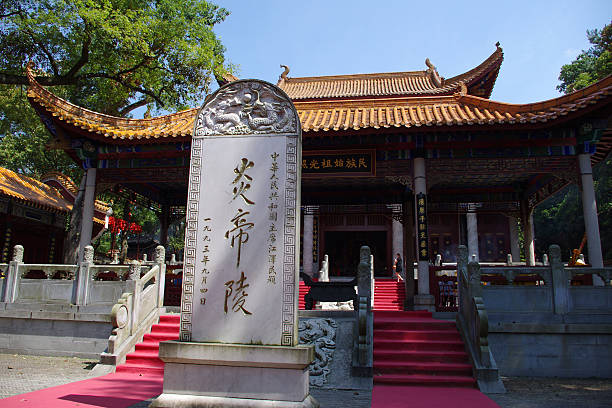
An Essential Guide to Visiting Yandi Mausoleum
In This Guide
- An Essential Guide to Visiting Yandi Mausoleum
- The Rich History and Legends of Yandi Mausoleum
- Main Highlights: What You Absolutely Can’t Miss
- Planning Your Visit: A Practical Guide
- Tickets: Prices, Booking, and Tips
- How to Get There: A Complete Transportation Guide
- Local Cuisine and Accommodation Nearby
- Frequently Asked Questions
- Final Thoughts on Your Trip
Nestled amidst the serene landscapes of Yanling County in Hunan Province, the Yandi Mausoleum stands as a testament to China’s rich historical tapestry. This sacred site, dedicated to the legendary Emperor Yandi, or Shennong, is not just a mausoleum; it is a pilgrimage for the descendants of the Yan Huang civilization, connecting visitors with the ancient roots of Chinese culture.
A Journey Through History
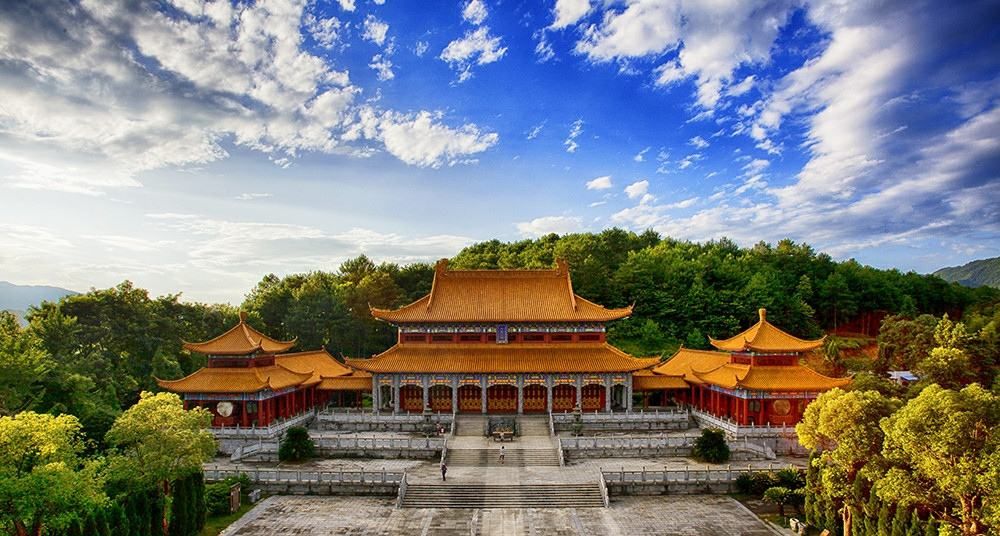
Yandi Mausoleum.
As one of the most revered figures in Chinese mythology, Emperor Yandi is celebrated as the “Divine Farmer,” credited with teaching agriculture and herbal medicine to humanity. The mausoleum serves as a place of homage, where the past and present intertwine, inviting travelers to explore its lush surroundings and the spiritual significance it holds.
What to Expect
Visitors will find themselves enveloped in a tranquil environment characterized by rolling hills, ancient trees, and flowing waters. The mausoleum complex is not only a site of reverence but also a landscape of beauty, offering picturesque views that reflect the harmony of nature and culture. The main hall, adorned with traditional architecture, serves as the focal point for various ceremonies held throughout the year, notably during the Qingming Festival, when worshippers gather to pay their respects.
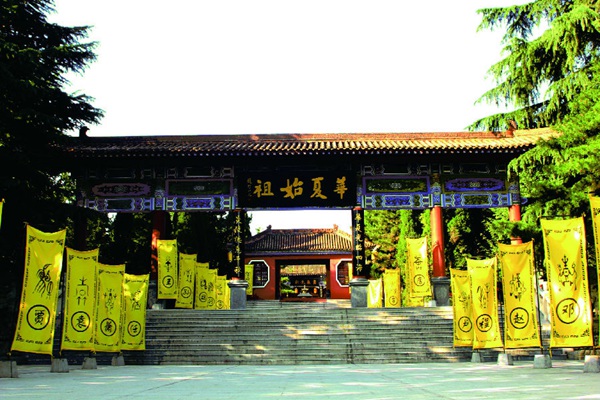
Yandi Mausoleum.
Plan Your Visit
The mausoleum is open daily from 8:00 AM to 7:00 PM, allowing ample time to immerse yourself in its serene atmosphere. While a visit can be accomplished in about an hour, taking a guided tour can enrich your experience, offering insights into the myriad stories and legends associated with this historic site. Surrounding attractions, such as the Shennonggu National Forest Park and the nearby Red Army Slogan Museum, make for perfect additions to your itinerary.
Tips for Travelers
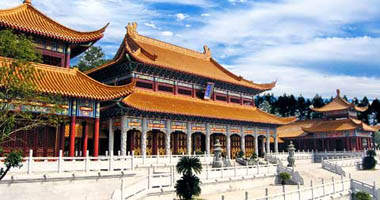
Yandi Mausoleum.
- Getting There: The Yandi Mausoleum is a short drive from the main urban centers in Hunan, making it easily accessible.
- What to Bring: If you wish to participate in the spiritual rituals, consider bringing incense, as offerings can enhance your connection to the site.
- Respect the Customs: As this is a sacred space, maintaining a respectful demeanor is essential during your visit.
Embark on a journey to the Yandi Mausoleum and discover the echoes of ancient Chinese civilization, where every stone and tree tells a story of resilience, respect, and reverence for the past.
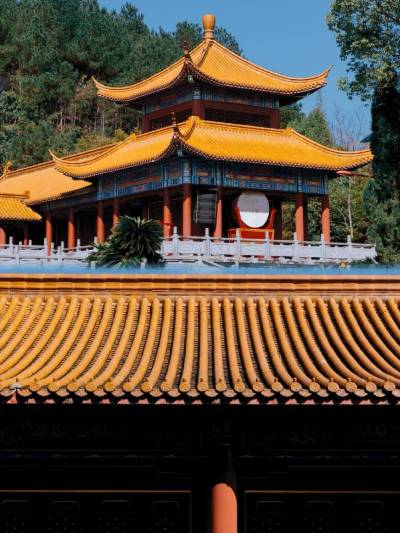
Yandi Mausoleum.
The Rich History and Legends of Yandi Mausoleum
Nestled in the picturesque landscape of Yanling County, the Yandi Mausoleum stands as a testament to China’s rich cultural heritage and history. This sacred site is dedicated to the legendary Emperor Yandi, also known as Shennong, who is revered in Chinese mythology as a pioneer of agriculture and herbal medicine. His contributions have left an indelible mark on Chinese civilization, making this mausoleum a pilgrimage site for those seeking to honor their ancestral roots and connect with ancient traditions.
Historical Significance
The Yandi Mausoleum is not merely a burial site; it is a symbol of reverence and remembrance for one of the legendary figures in Chinese history. Emperor Yandi is believed to have lived around 5,000 years ago and is credited with introducing the cultivation of grains, thus laying the foundation for Chinese agriculture. According to legend, he tasted hundreds of herbs to discern their medicinal properties, earning him the title of the “Divine Farmer.” This connection to agriculture and healing makes the mausoleum a site of great cultural importance, celebrating the origins of Chinese farming practices and traditional medicine.
The mausoleum itself has been a site of worship for centuries. It is said that the earliest structures were established during the Song Dynasty, with subsequent renovations and expansions reflecting the evolving respect for Emperor Yandi. The Five Grain Temple, located adjacent to the mausoleum, adds to the site’s historical depth, serving as a place where devotees express gratitude for the bountiful harvests attributed to Yandi’s teachings.
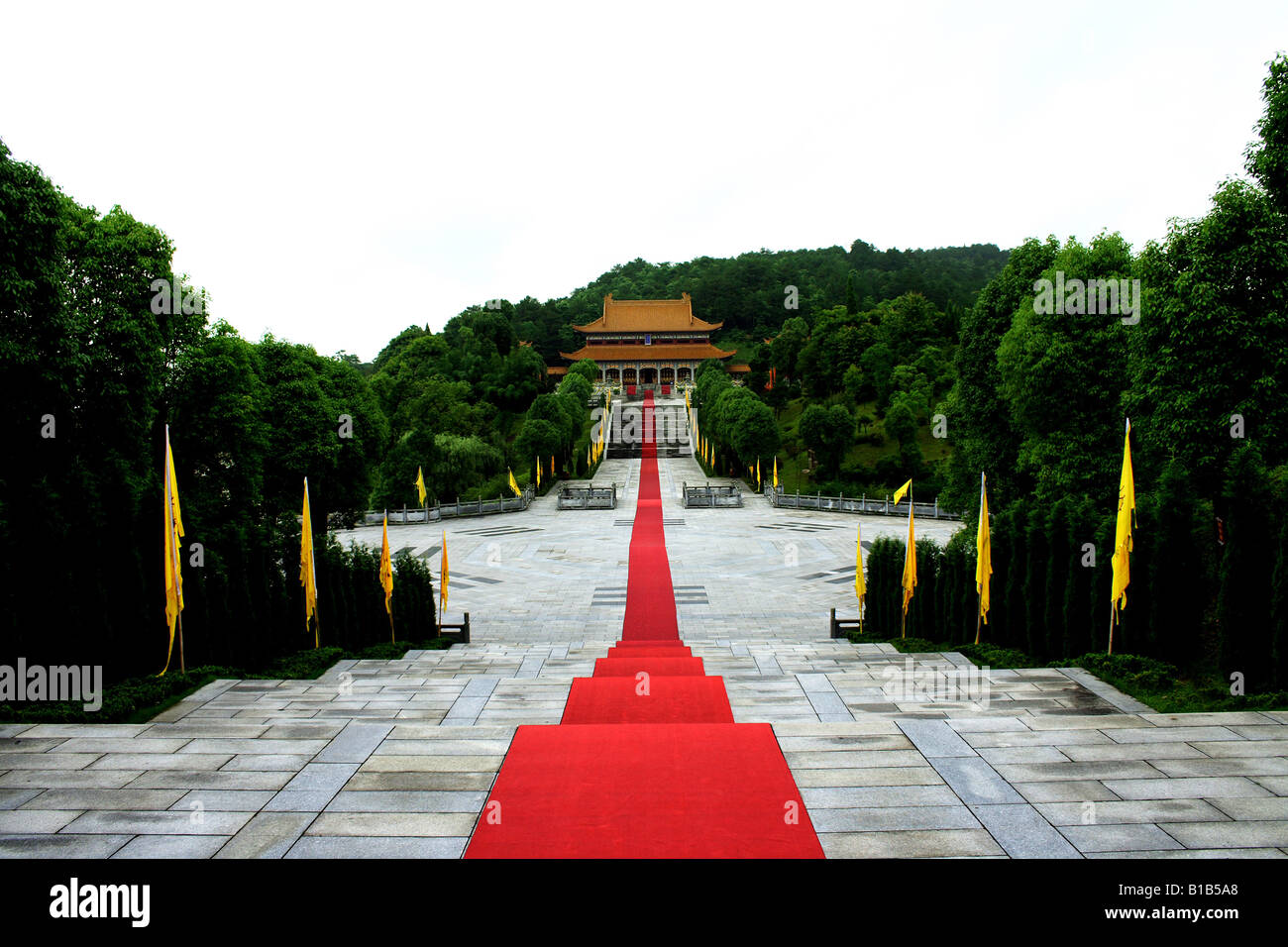
Yandi Mausoleum.
Legends and Myths
The myths surrounding Emperor Yandi are as rich as the history of the mausoleum itself. One of the most captivating legends tells of his birth. It is said that he emerged from a flower on the banks of the Yellow River, a sign that he was destined to cultivate the land and guide humanity. His mother, a celestial being, bestowed upon him the knowledge of agriculture and medicine, which he would later share with his people.
Another enchanting tale involves Yandi’s encounters with various mythical creatures. According to folklore, he once battled the fierce and ferocious beasts that roamed the land, using his wisdom and strength to tame them. This not only signifies his role as a protector of the people but also highlights the harmonious relationship between humanity and nature that he advocated.
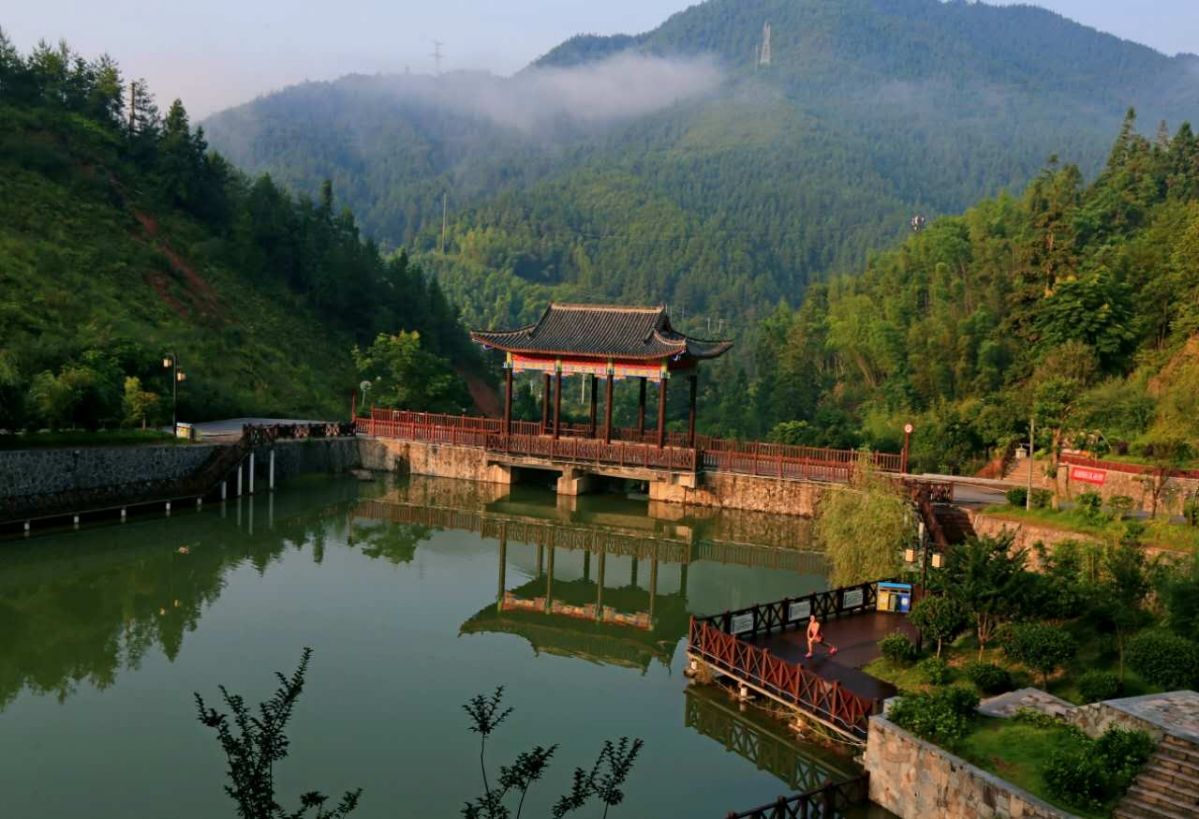
Yandi Mausoleum.
Cultural Heritage
In modern times, the Yandi Mausoleum continues to be a focal point for cultural activities and celebrations, particularly during the Qingming Festival, when descendants pay tribute to their ancestors. Visitors can experience the grandeur of the mausoleum, characterized by its majestic red walls and golden roof, which symbolize prosperity and respect. The surrounding landscape, marked by lush greenery and flowing waters, enhances the spiritual atmosphere of the site.
For international travelers, visiting the Yandi Mausoleum offers a unique opportunity to delve into the depths of Chinese history and mythology. Guided tours are available, where knowledgeable local guides share stories that breathe life into the ancient legends, making the visit not only educational but also profoundly enriching.
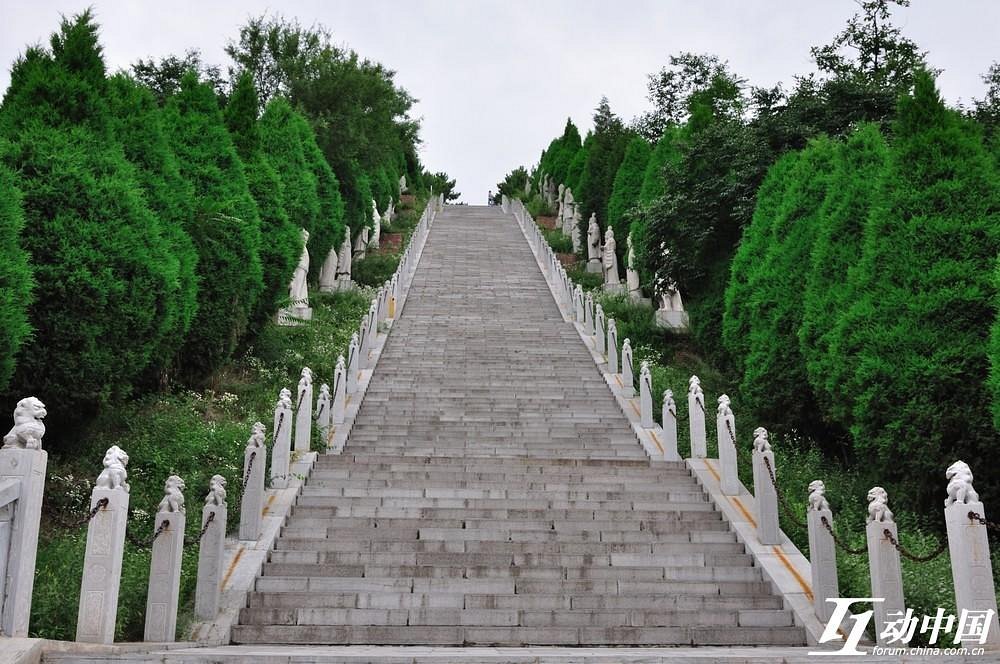
Yandi Mausoleum.
Conclusion
The Yandi Mausoleum is more than just a historical site; it embodies the spirit of a civilization that has revered nature, agriculture, and ancestral wisdom for millennia. As you walk along its paths, surrounded by the serene beauty of Yanling County, you are invited to reflect on the legacy of Emperor Yandi and the enduring traditions that continue to shape Chinese culture today. Whether you are a history enthusiast, a culture seeker, or simply a curious traveler, the mausoleum offers a glimpse into the profound relationship between humanity and the land, making it a must-visit destination in your exploration of China’s rich heritage.
Main Highlights: What You Absolutely Can’t Miss
Unmissable Highlights of Yandi Mausoleum (株洲炎帝陵)
Nestled in the picturesque landscape of Yanling County, the Yandi Mausoleum is a cultural treasure that resonates deeply with Chinese history. Dedicated to Emperor Yandi (Shennong), a legendary figure revered as a pioneer of agriculture and traditional medicine, this site is a must-visit for anyone interested in the rich tapestry of Chinese heritage.
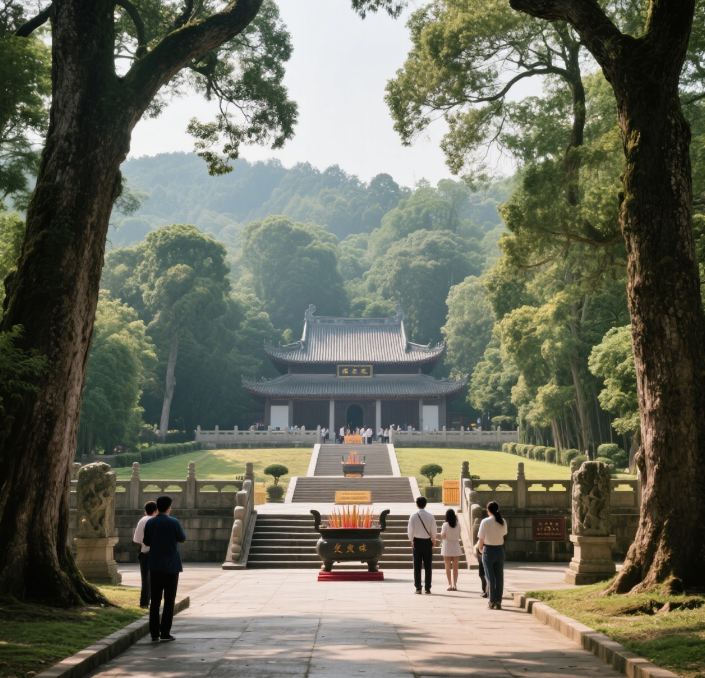
Yandi Mausoleum.
1. The Majestic Mausoleum
As you approach the mausoleum, the grandeur of the site envelops you. The main hall, adorned with golden tiles and red walls, stands as a testament to the architectural prowess of ancient China. Visitors are often moved by the solemnity of the space, which is not just a tomb but a revered site for ancestral worship, echoing the deep respect the Chinese culture holds for its forebears.
2. The Five Grain Temple
Located behind the mausoleum, the Five Grain Temple is a significant addition that enriches the historical narrative of the site. Dating back to the Song Dynasty, this temple has stood the test of time, embodying the agricultural legacy attributed to Yandi. The temple’s layout, featuring two courtyards and a series of halls, invites exploration and reflection. Don’t miss the opportunity to admire the stone tablet inscribed with “Yan Emperor’s Mausoleum,” a relic from the Ming Dynasty that adds to the temple’s historical significance.
3. Scenic Beauty
Surrounded by lush hills and flowing waters, the Yandi Mausoleum is set against a stunning natural backdrop. The serene environment enhances the spiritual atmosphere of the site, making it an ideal spot for contemplation. The happiness walkway offers a leisurely stroll through the beautiful landscape, allowing visitors to soak in the greenery and tranquility that this area provides.
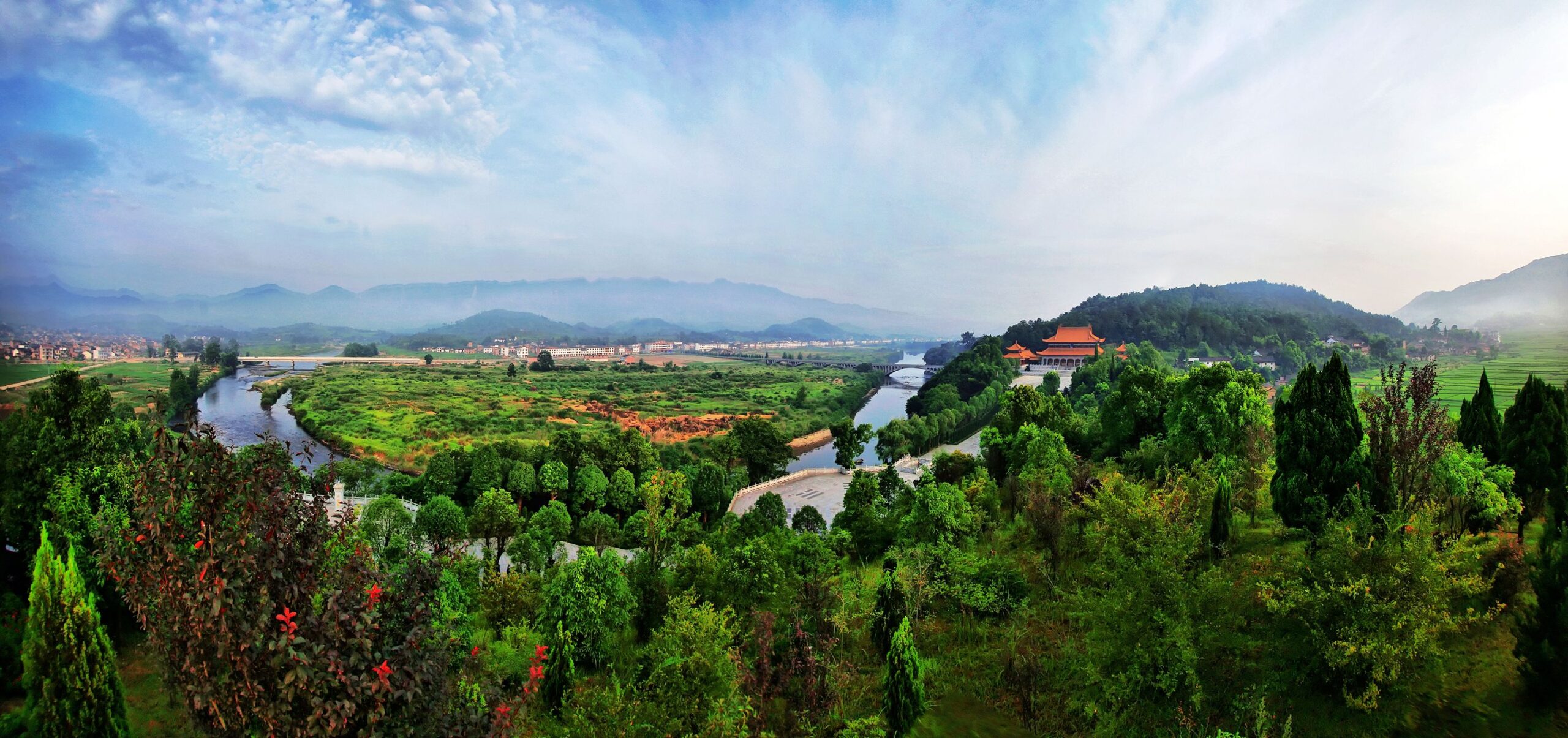
Yandi Mausoleum.
4. Cultural Rituals and Festivals
If your visit coincides with the Qingming Festival (Tomb-Sweeping Day), you’re in for a unique cultural experience. This traditional time for honoring ancestors sees large-scale ceremonies at the mausoleum, where locals and tourists alike participate in rituals that celebrate the legacy of Yandi. Witnessing these customs can provide profound insight into Chinese values surrounding family and ancestry.
5. Nearby Attractions
Extend your exploration by visiting nearby sites such as the Shennonggu National Forest Park, known for its diverse flora and fauna, or the Red Army Slogan Museum, which offers a glimpse into China’s revolutionary history. For a more leisurely experience, take a walk through Xiangshan Park, where you can enjoy the peaceful surroundings and local wildlife.
6. Accessibility and Visitor Information
- Opening Hours: The mausoleum is open daily from 8:00 AM to 7:00 PM, allowing ample time for exploration.
- Location: Situated in Luyuan Town, Yanling County, it is easily accessible for those traveling through the Hunan province.

Yandi Mausoleum.
Whether you’re a history buff, a nature lover, or simply curious about Chinese culture, the Yandi Mausoleum offers a rich tapestry of experiences that are sure to leave a lasting impression. Embrace the tranquil atmosphere, delve into the storied past, and witness the reverence held for one of China’s legendary figures.
Planning Your Visit: A Practical Guide
Essential Information for Your Visit to Yandi Mausoleum
Exploring the Yandi Mausoleum, the revered resting place of the Yan Emperor, is a journey through ancient Chinese history and culture. Nestled in the scenic Yanling County of Hunan Province, this site offers an immersive experience where visitors can reflect on the legacy of one of China’s legendary figures.
Location and Accessibility
Yandi Mausoleum is situated in Luyuan Town, Yanling County, approximately 17 kilometers northeast of Gaoping City. The mausoleum is surrounded by picturesque mountains and rivers, making it a serene place for contemplation and reflection.
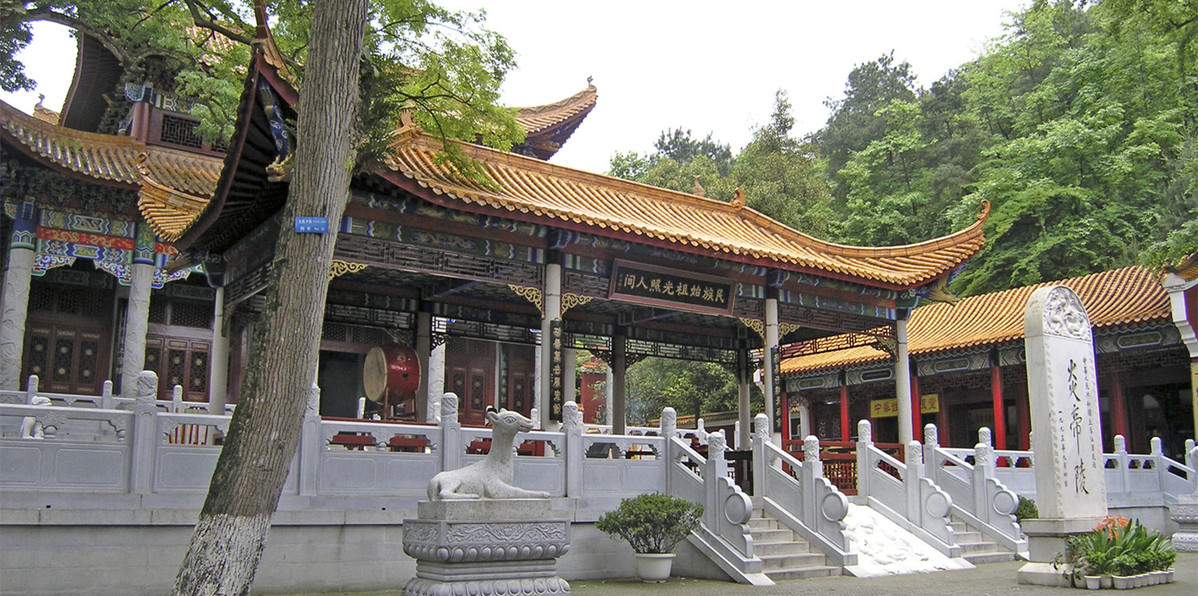
Yandi Mausoleum.
Address:
Luyuan Town, Yanling County, Hunan Province, China
Getting There:
– By Car: The mausoleum is accessible via local roads, and parking is available on-site.
– Public Transport: Check local bus services from major cities in Hunan for routes to Yanling County.
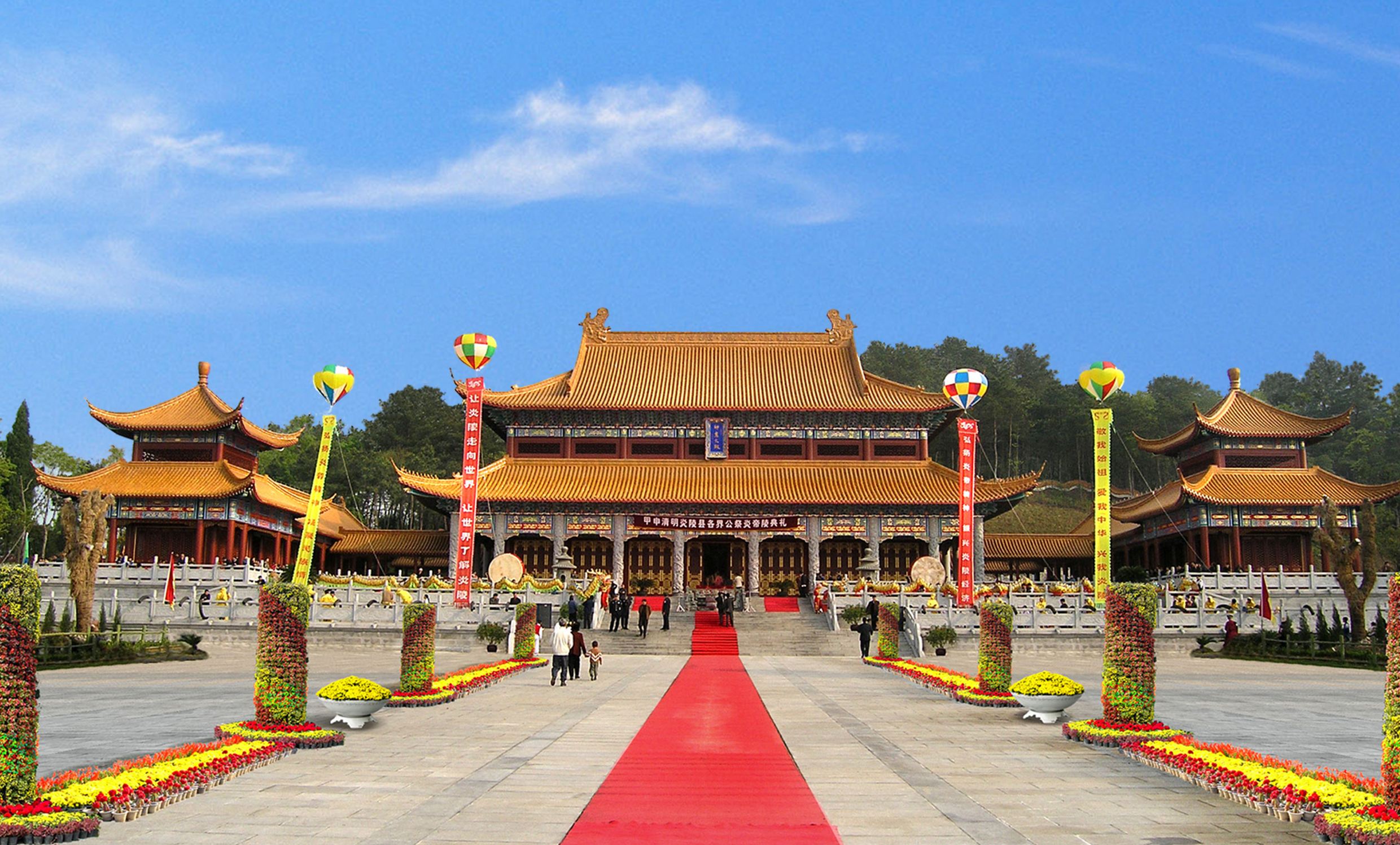
Yandi Mausoleum.
Opening Hours
The site is open daily from 8:00 AM to 7:00 PM, providing ample time for visitors to explore its beauty and historical significance.
Entry Fees
Visiting the Yandi Mausoleum is free of charge, allowing travelers to enjoy the expansive grounds without worrying about admission costs.
What to Expect
The mausoleum complex comprises several key features that are worthwhile to explore:
- Yandi’s Tomb: The central site where the Yan Emperor is believed to be interred.
- Five Grain Temple: Located behind the mausoleum, this ancient temple has roots dating back to the Song Dynasty and features a unique architectural style.
- Scenic Paths: The area surrounding the mausoleum is adorned with lush trees and flowing waters, offering visitors a chance to connect with nature.
- Cultural Activities: Engage in local rituals such as paying respects to ancestors and participating in seasonal festivals, particularly during the Qingming Festival.
Recommended Duration
Plan to spend about 1 to 2 hours exploring the mausoleum and its surroundings. This should give you enough time to appreciate the historical significance, take photographs, and enjoy the natural beauty.
Nearby Attractions
Enhance your visit by exploring other attractions in the vicinity:
– Shennonggu National Forest Park: A beautiful natural reserve perfect for hiking and enjoying the outdoors.
– Red Army Slogan Museum: A tribute to revolutionary history, offering insights into China’s military heritage.
– Xiangshan Park and Jinzi Peak: Ideal spots for breathtaking views and leisurely walks.
Tips for Your Visit
- Guided Tours: Consider hiring a local guide who can enrich your understanding of the site’s historical context through storytelling.
- Photography: Capture the stunning landscapes, especially the mausoleum’s architecture against the backdrop of the mountains.
- Respect Local Customs: When participating in rituals, be mindful of local customs and practices.
- Preparation: Bring water, especially during warmer months, and wear comfortable shoes for walking.
Conclusion
The Yandi Mausoleum is more than just a historical site; it is a place to appreciate the depth of Chinese culture and the legacy of its ancient emperors. Whether you are a history enthusiast or a casual traveler, this site offers a unique glimpse into the past, set amidst the breathtaking landscapes of Hunan Province. Enjoy your visit!
Tickets: Prices, Booking, and Tips
Visiting the Yandi Mausoleum offers travelers a unique glimpse into the rich tapestry of Chinese history, particularly the reverence surrounding the legendary Yan Emperor, Shennong. As you plan your visit, here’s everything you need to know about tickets, booking, and some helpful tips.
Ticket Information
-
Admission Fee: Access to the Yandi Mausoleum is free of charge. This makes it an excellent cultural stop for travelers looking to immerse themselves in Chinese heritage without additional costs.
-
Guided Tours: While entry to the mausoleum itself is free, consider hiring a local guide for a nominal fee. This can enhance your experience by providing in-depth historical context and stories behind various sites within the mausoleum complex.
Booking Details
-
Opening Hours: The mausoleum is open daily from 8:00 AM to 7:00 PM. It is advisable to arrive early to avoid the crowds, especially during weekends and public holidays.
-
Duration of Visit: Most visitors spend about 1 to 2 hours exploring the site. This duration allows ample time to appreciate the serene surroundings, participate in rituals at the temple, and take leisurely walks through the scenic landscapes.
Tips for Your Visit
-
Best Time to Visit: Spring (April to June) and autumn (September to November) are ideal for visiting, as the weather is mild and the natural scenery is at its most beautiful.
-
What to Bring: If you wish to participate in the traditional offerings or rituals, consider bringing incense or other small offerings. While these can be purchased on-site, prices may be higher.
-
Explore Nearby Attractions: After visiting the mausoleum, explore nearby attractions such as the Shennonggu National Forest Park or the Red Army Slogan Museum, both within a short distance and enriching your cultural experience.
-
Transportation: The mausoleum is located in Yanling County, which is accessible by public transport or taxi from nearby cities. If you’re driving, ample parking is available.
-
Respect Local Customs: When visiting the mausoleum, it’s important to be respectful of the site’s cultural significance. Dress modestly and maintain a quiet demeanor, especially in areas designated for rituals and memorials.
Conclusion
The Yandi Mausoleum stands as a testament to China’s profound history and cultural heritage. With free admission and a wealth of knowledge to gain from guided tours, it is a must-visit for anyone interested in the legacies of ancient China. Plan your visit thoughtfully, and you’ll surely come away with a deeper appreciation of this important historical figure and the beautiful landscapes that surround his resting place.
How to Get There: A Complete Transportation Guide
Navigating Your Way to Yandi Mausoleum: A Comprehensive Transportation Guide
Visiting the Yandi Mausoleum, a significant site steeped in ancient Chinese history, requires a bit of planning, especially for international travelers venturing into the scenic surroundings of Yanling County in Hunan Province. Here’s a detailed guide to help you reach this revered site with ease.
Getting to Yanling County
- By Air:
- Nearest Airport: The closest major airport is Changsha Huanghua International Airport (CSX), located approximately 90 kilometers southwest of Yanling County. This airport serves various domestic and international flights.
-
Transportation from the Airport:
- Taxi: Upon arrival, taxis are readily available outside the terminal. The ride to Yanling County will take about 1.5-2 hours depending on traffic.
- Airport Shuttle: Some shuttle services may operate to major cities in Hunan, including Zhuzhou, where you can catch a local bus or taxi to Yanling.
-
By Train:
- Train Stations: The nearest major train station is Zhuzhou Railway Station, which is well-connected to various cities in China, including Beijing, Shanghai, and Guangzhou.
-
From Zhuzhou to Yanling:
- After arriving at Zhuzhou, you can take a bus or taxi to Yanling County. The journey will take approximately 40 minutes by car.
-
By Bus:
- Long-Distance Buses: Several long-distance buses operate from major cities like Changsha and Zhuzhou to Yanling County. Visit the local bus station for schedules and ticket information.
- Bus Stations: The Yanling Bus Terminal is conveniently located near the center of the county, making it easy to access local transport options.
Local Transportation Options in Yanling
- Public Buses:
-
Yanling County has a network of public buses that can take you to the Yandi Mausoleum. Look for buses heading to Luyuan Town, where the mausoleum is located.
-
Taxis and Ride-Hailing Services:
-
Taxis are widely available, and ride-hailing apps such as Didi Chuxing are operational in the area, providing a convenient way to navigate to your destination.
-
Walking:
- If you’re staying in Yanling County, consider exploring on foot. The area surrounding the Yandi Mausoleum is scenic and pedestrian-friendly, allowing you to soak in the local atmosphere.
Visiting Yandi Mausoleum
- Opening Hours: The mausoleum is open daily from 8:00 AM to 7:00 PM. Plan your visit accordingly to make the most of your time exploring this historical site.
- Admission Fee: Entry to the Yandi Mausoleum is free, which makes it an accessible destination for all travelers.
Final Tips
- Language Barrier: While some locals may speak basic English, it’s advisable to have a translation app or a phrasebook handy to navigate communication.
- Cultural Considerations: As a site of historical significance, visitors are encouraged to respect local customs and traditions during their visit.
With this guide, you’ll be well-prepared to embark on your journey to the Yandi Mausoleum, where history and culture await amidst the stunning landscapes of Hunan Province. Happy travels!
Local Cuisine and Accommodation Nearby
Savoring Yanling: Culinary Delights and Comfortable Stays Near Yandi Mausoleum
As you embark on your journey to the historically rich Yandi Mausoleum in Yanling County, it’s essential to delve into the local cuisine and find accommodations that enhance your travel experience. Here’s a curated guide to the flavors and places to stay that will make your visit all the more memorable.
Local Cuisine to Try
- Hunan Cuisine (湘菜)
Known for its bold flavors and spiciness, Hunan cuisine is a must-try while in Yanling. Look for: - Spicy Steamed Fish (剁椒鱼头): A local specialty featuring fish head marinated in a fiery chili sauce, steamed to perfection.
- Stir-fried River Shrimp (小龙虾): Fresh and succulent, these shrimp are often prepared with garlic and chili, delivering a delightful kick.
-
Preserved Vegetables (腌菜): Often served as a side, these pickled delights add a tangy contrast to the rich main dishes.
-
Street Food
Wander through local markets and sample: - Grilled Skewers (串串): A variety of meats and vegetables grilled over charcoal, seasoned with a mix of spices.
-
Rice Noodle Soup (米粉汤): A comforting bowl of soft rice noodles served with a rich broth, fresh herbs, and your choice of toppings.
-
Local Snacks
Don’t miss out on trying: - Dried Tofu (干豆腐): Seasoned and often served as a cold dish, it’s a favorite among locals.
- Sweet Potato Balls (地瓜球): Crispy on the outside and soft on the inside, these sweet treats are perfect for a quick snack.
Accommodation Options
For a restful stay, consider the following accommodations near Yandi Mausoleum:
- Yanling Hotel (炎陵宾馆)
- Overview: This hotel offers comfortable rooms and is conveniently located near local attractions.
- Amenities: On-site restaurant serving Hunan cuisine, free Wi-Fi, and a business center.
-
Ideal for: Travelers seeking a blend of comfort and accessibility.
-
Hunan Yandi Resort (炎帝大酒店)
- Overview: Nestled in a scenic area, this resort provides a tranquil environment perfect for relaxation after a day of exploring.
- Amenities: Spa services, outdoor pool, and guided tours to nearby attractions.
-
Ideal for: Families and travelers looking for a comprehensive leisure experience.
-
Local Guesthouses
- For a more authentic experience, consider staying at one of the local guesthouses. They offer cozy accommodations and often include breakfast featuring traditional Hunan dishes, providing a taste of local hospitality.
Final Thoughts
Your visit to the Yandi Mausoleum is not just a journey through history; it’s an opportunity to indulge in the vibrant flavors of Hunan and enjoy warm, welcoming accommodations. Whether you’re savoring spicy dishes or resting in a comfortable hotel, the essence of Yanling will surely enrich your travel experience.
Frequently Asked Questions
Frequently Asked Questions About Yandi Mausoleum
1. What is the Yandi Mausoleum?
The Yandi Mausoleum, located in Yanling County, Hunan Province, is a significant historical site dedicated to Emperor Yan, also known as Shennong, who is revered as a cultural hero and agricultural god in Chinese mythology. The site features a grand mausoleum set in a picturesque landscape, surrounded by mountains and rivers.
2. What are the hours of operation for the mausoleum?
The Yandi Mausoleum is open daily from 8:00 AM to 7:00 PM. It’s advisable to check for any seasonal changes in hours before your visit.
3. How do I get to the Yandi Mausoleum?
The mausoleum is located in Luyuan Town, Yanling County, approximately 17 kilometers from Zhuzhou City. Visitors can reach the site by taxi or local buses. For those driving, ample parking is available near the entrance.
4. Is there an entrance fee?
Admission to the Yandi Mausoleum is free, making it an affordable destination for travelers interested in Chinese history and culture.
5. How long should I plan to spend at the mausoleum?
A visit to the Yandi Mausoleum typically takes around 1 to 2 hours. This allows enough time to explore the main attractions, including the Grand Hall and the scenic paths around the mausoleum.
6. Are there guided tours available?
Yes, guided tours are available and highly recommended. Engaging a local guide can enhance your experience, as they provide insightful stories and historical context about the site and its significance.
7. What nearby attractions should I visit?
While at the Yandi Mausoleum, consider exploring the following nearby attractions:
– Shennonggu National Forest Park – A beautiful area perfect for hiking and enjoying nature.
– Red Army Slogan Museum – Offering a glimpse into military history.
– Xiangshan Park – A peaceful park ideal for relaxation and enjoying the landscape.
8. What should I bring for my visit?
When visiting the Yandi Mausoleum, it’s a good idea to bring:
– Comfortable walking shoes for exploring the grounds.
– Water and snacks for a pleasant day trip.
– Camera to capture the stunning scenery and architecture.
– Cash for any local purchases, as some vendors may not accept cards.
Visiting the Yandi Mausoleum provides a unique opportunity to immerse yourself in Chinese history and culture, all set against the backdrop of beautiful natural scenery.
Final Thoughts on Your Trip
As you wrap up your visit to the Yandi Mausoleum, take a moment to reflect on the rich tapestry of history and culture that surrounds this remarkable site. Nestled in the stunning landscapes of Yanling County, the mausoleum not only honors the legendary Yan Emperor Shennong, a pivotal figure in Chinese mythology and agriculture, but also serves as a serene sanctuary for introspection and appreciation of nature.
A Journey Through Time
The experience at Yandi Mausoleum is more than just a glimpse into the past; it’s an invitation to connect with the roots of Chinese civilization. The mausoleum’s architecture, with its golden roofs and red walls, stands as a testament to the reverence held for the Yan Emperor, while the surrounding natural beauty—majestic mountains and flowing waters—offers a peaceful escape from the bustle of modern life.
Tips for Your Visit
- Engage with the Stories: Consider hiring a local guide to dive deeper into the fascinating legends and historical narratives associated with the site. Each corner of the mausoleum has its own story waiting to be uncovered.
- Plan Your Timing: The mausoleum is open from 8:00 AM to 7:00 PM, making it easy to fit into your itinerary. Early morning visits provide a tranquil atmosphere, perfect for reflection.
- Explore Nearby Attractions: Enhance your experience by visiting nearby sites such as the Shennonggu National Forest Park or the Red Army Slogan Museum. Each offers unique insights into the region’s natural beauty and military history.
Final Reflections
Leaving the Yandi Mausoleum, you carry with you not just the memories of a beautiful landscape, but also a profound understanding of the cultural significance that this site holds. Whether you are a history enthusiast, a nature lover, or simply seeking a moment of peace, the Yandi Mausoleum invites you to explore the essence of Chinese heritage.
Embrace the stories, cherish the moments, and allow the spirit of the Yan Emperor to inspire your own journey ahead. Safe travels!